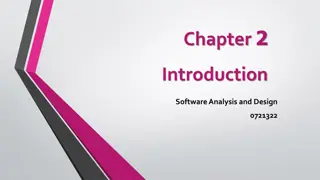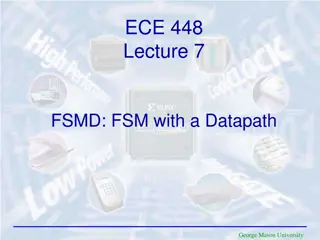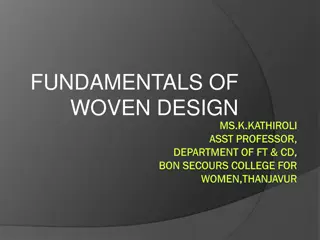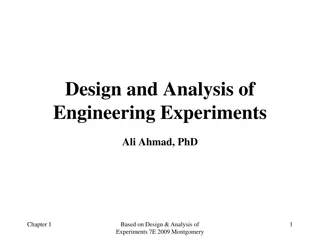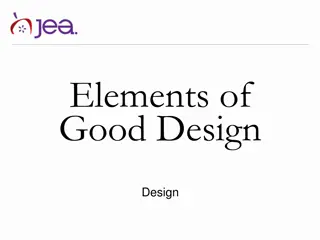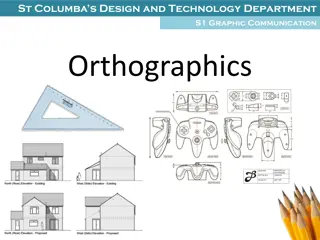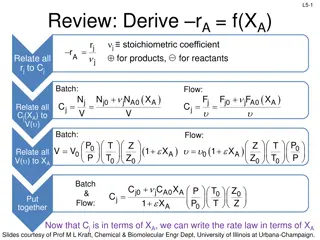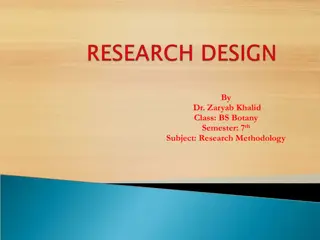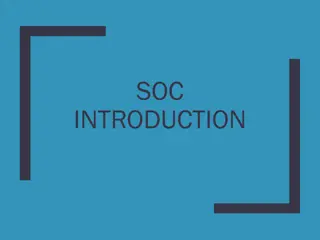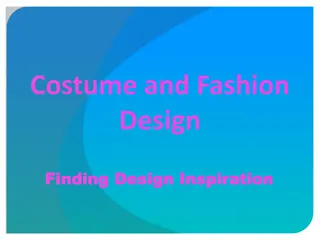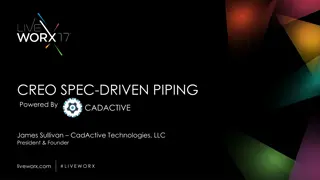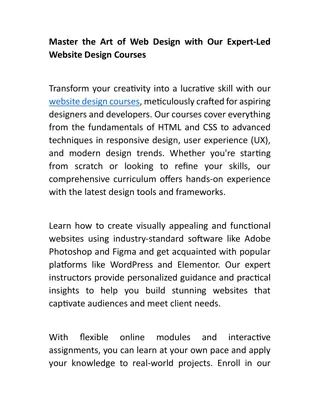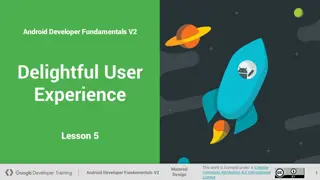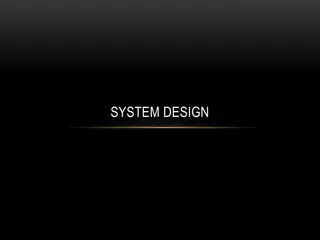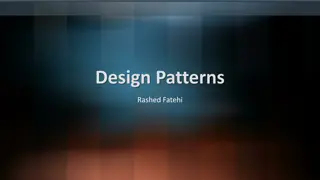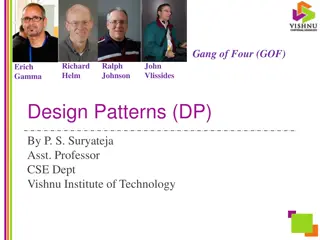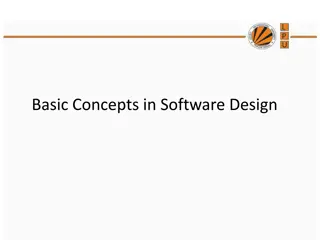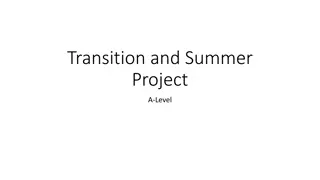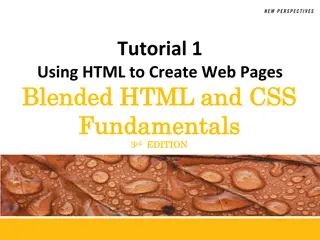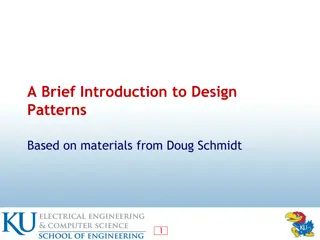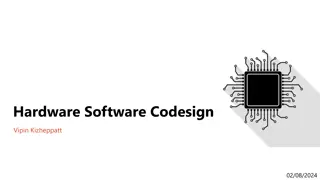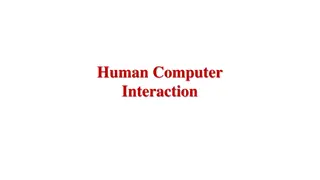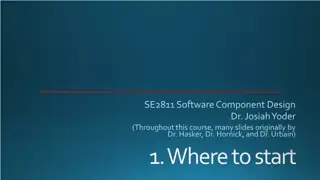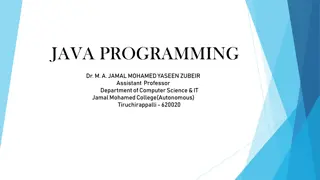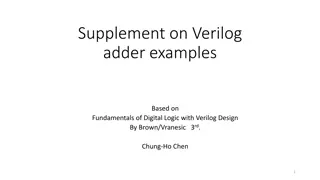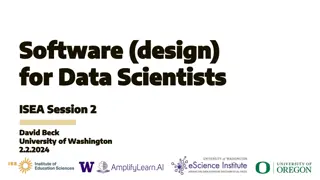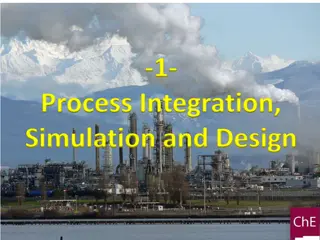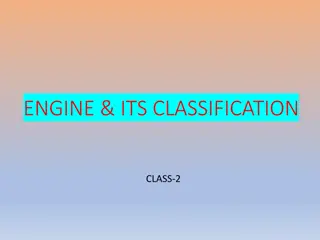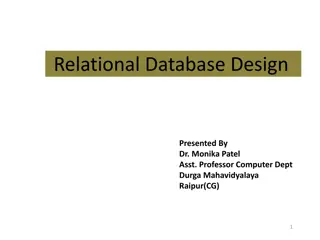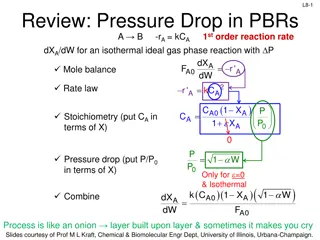GCSE Design Technology Knowledge Organiser and Course Structure Overview
In this detailed knowledge organiser, find information about the GCSE Design Technology course structure, learning objectives, mission statement, and core technical principles for KS4 students. The course emphasizes iterative design cycles, creative thinking, problem-solving, and addressing environm
7 views • 53 slides
Software Analysis and Design Process
Software analysis and design involve a systematic approach to understanding user requirements, creating logical models, and transitioning to detailed design specifications. Requirements analysis focuses on capturing system requirements, while design translates these requirements into implementation
8 views • 16 slides
Textil School for Design, Technology, and Management - Overview
The Textil School for Design, Technology, and Management is a renowned institution funded by the European Union. Offering undergraduate applied studies in Textile and Apparel Design, Textile Engineering, and Management in the Textile Industry, the school focuses on artistic expression, modern method
0 views • 16 slides
If you are looking for Therapy For Stress in Millfarm
If you are looking for Therapy For Stress in Millfarm, Fundamentals Psychotherapy is a reputable counselling service that offers professional and compassionate support to individuals seeking mental health assistance. With a team of experienced therapists, Fundamentals Psychotherapy provides a safe a
1 views • 6 slides
FSMD: FSM with Datapath in FPGA Design
Explore the concept of Finite State Machine with Datapath (FSMD) in FPGA design, as discussed in the lecture at George Mason University. Learn about translating sequential algorithms into hardware, using registers and control paths to simulate variables, and realizing systems through RTL design. Dis
5 views • 54 slides
Fundamentals of Woven Design Explained
Woven fabrics are created by interlacing warp and weft threads, offering diverse design possibilities. Learn about woven structures, elements of design, and the classification of woven fabrics. Discover the intricacies of design, draft plans, and peg/lifting plans essential for weaving projects.
0 views • 18 slides
Design and Analysis of Engineering Experiments in Practice
Explore the fundamentals of engineering experiments, including blocking and confounding systems for two-level factorials. Learn about replicated and unreplicated designs, the importance of blocking in a replicated design, ANOVA for blocked designs, and considerations for confounding in blocks. Dive
0 views • 15 slides
Fundamentals of Design: Elements, Principles, and Formats
Understanding the essentials of design such as elements like text, graphics, and white space, principles like dominance, and formats like page layout and measurement units are crucial for creating visually appealing and effective designs. Designers need to grasp concepts like unity, consistency in m
0 views • 40 slides
Guidelines for Design of Cement Concrete Pavement and Interlocking Paver Blocks
This document provides guidelines for designing cement concrete pavements and interlocking paver blocks, covering factors governing design, wheel loads, design period, subgrade characteristics, approximate k values based on CBR values, and the importance of a sub-base below concrete pavements. It em
0 views • 67 slides
Orthographic Drawing in Design and Technology Education
Delve into the world of orthographic drawing through St. Columba's Design and Technology Department's S1 Graphic Communication program. Discover the significance of orthographics in visualizing 3D objects as 2D drawings, learn about orthographic views like Elevation, Plan, and End Elevation, and exp
0 views • 8 slides
Software Engineering Design Principles and Concepts
The chapter discusses the essential principles and concepts in software design, highlighting the four key design models - data design, architectural design, interface design, and component-level design. It emphasizes the importance of traceability to the analysis model, minimizing the gap between so
2 views • 36 slides
Fundamentals of Chemical Kinetics and Reactor Design
Explore the realm of chemical reactions, rate equations, and reactor design in this informative chapter. Understand the factors influencing reaction rates, different types of reactions, rate laws, and experimental determination of reaction rates. Dive into examples illustrating stoichiometry and rat
0 views • 19 slides
Chemical Reactor Design Principles
Explore the fundamentals of chemical reactor design, including stoichiometry, reaction rates, and reactor scale-up. Learn to derive rate laws and design equations in terms of conversion for batch, CSTR, and PFR reactors. Discover the logic behind isothermal reactor design and calculation of required
0 views • 21 slides
Research Design in Botany: An Overview
Explore the fundamentals of research design in botany through topics like introduction, parts, features, and importance. Learn about the meaning of research, problem formulation, data collection, and different types of research approaches such as descriptive, applied, quantitative, and qualitative.
0 views • 19 slides
System on Chip (SoC) Design and Components
Explore the world of System on Chip (SoC) design, components, and working flow. Learn about Intellectual Properties (IP), platform-based design, typical design flows, top-down design approach, and the emerging Electronic System Level (ESL) design flow. Discover the essential components of an SoC, su
0 views • 45 slides
Design Inspiration and Elements in Costume and Fashion Design
Dive into the world of costume and fashion design through a visual journey of finding design inspiration, understanding the design process, emphasizing originality, and exploring different sources of creativity. Discover how technology, art, food, history, architecture, and nature can spark innovati
0 views • 45 slides
Enhancing Piping Design Efficiency with Spec-Driven Technology
Explore how Spec-Driven Piping technology powered by CADACTIVE offers a standardized approach for piping design in Creo Parametric. This innovative extension streamlines design communication, eliminates errors, and improves design efficiency by utilizing a master catalog, automated checking capabili
0 views • 15 slides
Master the Art of Web Design with Our Expert-Led Website Design Courses
Transform your creativity into a lucrative skill with our website design courses, meticulously crafted for aspiring designers and developers. Our courses cover everything from the fundamentals of HTML and CSS to advanced techniques in responsive desi
0 views • 2 slides
U.S. Monetary Policy Spillovers to Middle East and Central Asia: Shocks and Fundamentals Impact
The research explores the impact of U.S. monetary policy spillovers on the Middle East and Central Asia regions, focusing on shocks and country fundamentals. It examines historical data, model analysis, and the 2022 tightening effects. The study reveals that both contractionary monetary policy shock
0 views • 20 slides
Material Design: Combining Classic Design Principles with Technological Innovation
Material Design is a design language that combines traditional design principles with the possibilities offered by technology and science. It emphasizes visual language, classic design elements, and innovation to create delightful user experiences. The Material Metaphor, Imagery, Typography, Color,
0 views • 34 slides
Comprehensive Guide to System Design Components and Techniques
System design involves the detailed planning and identification of components in an information system, aiming to provide users with a general understanding of the new system. This process includes techniques like flowcharts, prototyping, and component design, covering aspects such as output design,
0 views • 24 slides
Design Patterns: A Comprehensive Overview
Exploring the world of design patterns, this content delves into the essence of design patterns, their application in software design to resolve complexity, and the different types of design patterns - creational, structural, and behavioral. It also showcases examples of popular design patterns such
0 views • 22 slides
Introduction to Design Patterns: Understanding GOF Patterns
Explore the world of design patterns with a focus on Gang of Four (GOF) patterns. Understand the essence of design patterns, learn about GOF patterns, and discover how to select, apply, and use these patterns effectively. Dive into the fundamentals of design patterns, including creational and struct
0 views • 115 slides
Basic Concepts in Software Design
Software design involves transforming customer requirements into a form suitable for implementation, with activities categorized into preliminary and detailed design stages. High-level design focuses on module identification and control relationships, while detailed design entails defining data stru
1 views • 24 slides
3D Design and Critical Analysis in Architecture
Dive into the world of 3D design and critical analysis with a focus on architecture. Discover the stages of design, essential skills for designers, and areas of study in three-dimensional design. Delve into iconic buildings like Frank Lloyd Wright's Falling Water, analyze their key features, and eve
0 views • 9 slides
HTML and CSS Fundamentals for Web Design
Delve into the essential concepts of HTML, XHTML, and CSS in the context of creating web pages. Learn about the Internet's history, the role of web browsers, and the significance of hypertext and markup languages. Enhance your skills by studying image files, HTML tags, formatting techniques, and mor
0 views • 32 slides
Design Patterns in Object-Oriented Design
Design patterns in object-oriented design (OOD) are essential templates that codify best practices for solving common problems. They help streamline development by capturing proven design decisions, promoting code reuse, and enhancing system flexibility and modularity. Learn about the core concepts,
0 views • 20 slides
Hardware-Software Codesign Course Details
This comprehensive hardware-software codesign course presented by Vipin Kizheppatt covers various aspects such as course management, objectives, prerequisites, evaluation components, software fundamentals, and practical applications. The course aims to equip participants with the skills to design an
0 views • 14 slides
Interaction Design in Human-Computer Interaction
Interaction design focuses on creating interactive products that are easy, effective, and enjoyable to use. It aims to reduce negative user experiences while enhancing positive ones. Designing interactive products requires understanding user activities, interfaces, and device arrangements to support
0 views • 11 slides
SE2811 Software Component Design Overview
This course covers software component design, design patterns, object-oriented design, algorithms, and opportunities for reuse in systems design. It emphasizes the importance of domain-level design and provides insights into solving core problems through reusable classes.
1 views • 21 slides
Fundamentals of Object-Oriented Programming in Java
Object-Oriented Programming (OOP) is a methodology that simplifies software development by using classes and objects. This paradigm includes concepts like Object, Class, Inheritance, Polymorphism, Abstraction, and Encapsulation. Other terms used in OOP design include Coupling, Cohesion, Association,
0 views • 54 slides
Analysis of Bunch Lengthening in CEPC for Different Design Parameters
This study explores bunch lengthening in the Circular Electron Positron Collider (CEPC) for various design parameters, analyzing a 54 km design scheme, a 61 km design scheme, and a 100 km design scheme. The analysis includes the theoretical framework used, equations for bunch lengthening, and conclu
1 views • 15 slides
Plain & Reinforced Concrete Structures in Design Engineering
In the design of Plain & Reinforced Concrete structures, various strength design methods such as Ultimate Strength Design (USD) and Allowable Strength Design (ASD) are utilized. These methods involve factors of safety, material strength, load factors, and analysis in the elastic range. Additionally,
0 views • 11 slides
Verilog Adder Examples & Typical IC Design Flow
This comprehensive content delves into Verilog adder examples, typical IC design flow, physical design considerations, and examples of OpenGL ES GPU and ARM hypervisor applications. It covers the fundamentals of digital logic with Verilog design, hardware description language, FPGA prototyping, phys
1 views • 27 slides
The Importance of Software Design for Data Scientists
Today's ISEA Session 2 with David Beck from the University of Washington delves into the critical role of intentional software design for data scientists. The session covers the software design approach, user-centric design stories, use cases, components, testing strategies, and the benefits and dra
1 views • 76 slides
Fundamentals of Process Integration, Simulation, and Design
This course covers the fundamentals and applications of process integration, simulation, and design. Students will learn systematic tools for synthesizing process flow sheets, apply principles of process economics, and gain skills in using computer-aided engineering systems for chemical simulations.
0 views • 12 slides
Engine Classification and Design
Engine classification involves categorizing engines based on various factors such as combustion type, number of strokes, cylinder design, and ignition method. Common classifications include external and internal combustion engines, as well as categories based on the design and use of the engine. Add
0 views • 11 slides
Object-Oriented Systems Analysis and Design (OOSAD) Using Unified Modeling Language (UML)
Explore the fundamentals of object-oriented analysis and design using UML, a powerful tool for constructing and visualizing systems. Learn about object-oriented concepts, classes, inheritance, UML diagrams, use case modeling, activity and sequence diagrams, and more. Discover how UML can enhance the
0 views • 144 slides
Relational Database Design Fundamentals
This content delves into the crucial aspects of relational database design, including normalization, pitfalls, RDBMS design issues, and the overall database design process. It emphasizes the need for well-structured relation schemas to minimize redundancy, ensure data integrity, and facilitate effic
1 views • 53 slides
Reactor Design Fundamentals: Rate Laws and Analysis
This content covers the analysis of pressure drop in packed bed reactors, determining reaction order, and studying rate data for reactor design. It delves into stoichiometry, kinetics, fluid dynamics, and the challenges of collecting and analyzing rate data. Examples of rate laws and reactions are p
0 views • 32 slides

